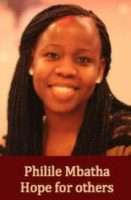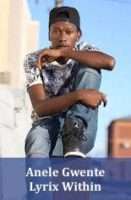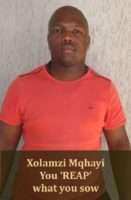In the olden days a woman’s place was said to be ‘in the kitchen’. The husband would go out to the mines and work for his bread, while the mother stayed home doing housework and babysitting. Gone are those days now. Women have become independent and now enjoy the same rights as men. Our inspiration this week is one such modern woman who has ‘taken over the world’.
Philile Mbatha, born and bred in Umlazi in KwaZulu-Natal, is among the first black female South Africans to study towards her PhD in Environmental Science. She is currently a third year PhD candidate at the University of Cape Town (UCT) where she works as a researcher. Through her hard work and dedication, Philile was also awarded a one year scholarship to study at Yale University in America in 2013/2014.
It’s safe to say that Philile has always been a sharp knife in the drawer.
“I passed my Matric with four distinctions … and got an architecture scholarship to the University of KwaZulu-Natal in 2003,” says Philile.
But just like any ‘sharp knife’, Philile went through several rough patches that eventually honed her.
“When I got into UKZN I did the Architecture and really hated it. It was dreadful. I knew I’d have to change it at the end of the year.”
Her parents didn’t take this news well and the scholarship would certainly pull their architecture-specific financial support, but she took the risk and went ahead anyway.
“I enrolled for Geography and Environmental Management because I’ve always loved geography and environmental issues. My dad paid for my registration and I applied to NSFAS.”
Just when she thought she had found her area of study , Philile soon learnt that her nightmares were far from over. “[People] were questioning my decision. I got frustrated and began to wonder if I had taken the right step.”
She still didn’t know if Environmental Science was the right course for her; the only thing she knew for sure was that she just wanted to help people.
“I didn’t even know how my major was going to help me ever achieve that. It was a very humbling experience in my life and at the same time a lot came from it. It was necessary for me to go through that.”
After those heavy floods of doubt, Philile began to see a rainbow. “One of my lecturers, Prof Dianne Scott, approached me. She told me I had a potential and she’d like to mentor me. She offered me a scholarship.”
Philile eventually finished her degree in Environmental Science at UKZN and was able to head straight on to her Honours degree.
“I got a scholarship from Eskom. It turned out that I was actually the only student who got that scholarship in the entire KZN region.”
Eskom promised her a permanent position after completing her Honours, but Prof Scott disapproved.
“I thought my life was set, but Prof Scott said that working for Eskom would be limiting myself and I’d not be able to grow. She said someone with Masters would come in and be my superior.”
Philile had told herself she wouldn’t study any further, but an opening came up at UCT for a Masters project with scholarship.
“I then applied, just to please Prof Scott. To my surprise, I got an email saying I got the scholarship.”
This was both good and bad news for Philile. It meant that she’d have to leave behind the place that raised her up, and all her loved ones.
“I had never dreamt of going to Cape Town ever. I thought there was no way my parents would consent to that, and father was already looking forward to the money I’d receive from Eskom.”
But because her parents had her interests at heart, they allowed it and that’s when she came to Cape Town, in 2009.
“The Masters project I was going to be part of was exactly something that I’d be interested in … it just spoke to me.” Her dissertation, entitled Sharing benefits from coastal resources with rural communities in South Africa: The influence of institutional arrangements, indeed blended her love of environmental science with her desire to help people. Her case studies were among people of the fisheries and mining sectors in the Eastern Cape and KwaZulu-Natal.
Philile says she finally understood her purpose in life, and her passion helped her duck even when life threw stones at her. “I went from an Eskom scholarship to a scholarship that was half of that. But my passion pulled me through.”
Sure enough, Philile passed her Masters with a distinction.
“Then I thought, ‘Yes! I’m finally going to work for Eskom,’ but my UCT supervisor said they’d hire me here as a researcher.”
Philile says part of the reason she stayed was that the people who funded her Masters project were so impressed that they asked her and her supervisors to convert her Masters project into a book, which was published by UCT Press in 2014. The book is entitled “Sharing benefits from the Coast: Rights, Resources and livelihoods (and is edited by her supervisors).
“In 2013 I started my PhD because I’m passionate about helping out. This is more than just a PhD – I’m hoping to change people’s lives through my research. This is exactly what I’m supposed to be.”
Philile had indeed finally discovered her passion and everything else just fell into place. Opportunities were knocking on her door.
“Going to Yale [in 2013] helped me develop my skills. It took my work to a higher level because I discovered the main causes to the problems we face.” She says she learnt a lot about how the world works. For example, she now believes that, “America controls the world agenda. They influence the policies and the laws that we (developing countries) adopt.”
Philile may be an expert in Environmental Science but life soon taught her that the grass is not always greener on the other side. “Certain people at Yale looked down on me because I’m African and a female. Sometimes I could feel like they were giving me that ‘Why is she even here?’ look. It’s sad to see that racial discrimination still exists.”
Philile emphasizes the significance of education but warns the youth not to study only for money. She credits her success to her supervisors at UKZN and UCT, and her parents.
“The schools we attended weren’t as expensive as other private schools but it was more than what they could afford. My parents really gave it their everything and I’m grateful for that.”
She also extends her gratitude to GreenMatter in partnership with the Harley Crossley Foundation for the financial aid and mentorship they’ve provided.
It doesn’t take a professor to see that Philile remains a humble individual. “I’m not here today because I was better than anyone else. I’m here through God’s grace.”
Philile is set to conclude her PhD at the end of this year (2015) or the beginning of 2016.
Reflecting on her academic experience so far she is of the opinion that universities need to work on transformation policies and involve more women in her field.
“More incentives need to be provided for black South Africans to enter academia. Admission requirements need to be altered to accommodate women and previously disadvantaged groups.”
Philile concludes by saying she wants to set an example and be a role model, especially to black females: “I want them to look at me and say, ‘If she can make it and she’s from Umlazi then there’s hope for me.’”






